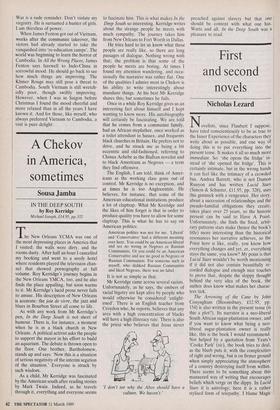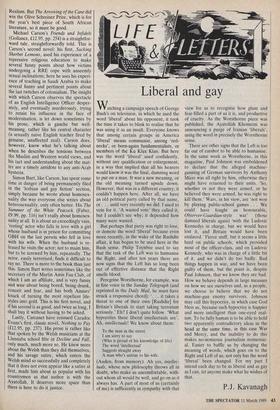First and second novels
Nicholas Lezard
Novelists, since Flaubert I suppose, have tried conscientiously to be as true to the Inner Experience of the characters they write about as possible, and one way of doing this is to put everything into the present tense. It makes it all so much more immediate. So: 'she opens the fridge' in- stead of 'she opened the fridge'. This is certainly intimate, but in the wrong hands it can feel like the intimacy of a crowded bus. Andrea Barrett, who is not Damon Runyon and has written Lucid Stars (Simon & Schuster, £11.95, pp. 328), uses this gimmick with a vengeance. Her story, about a succession of relationships and the pseudo-familial obligations they create, takes place over 25 years, so the historic present can be said to Have A Point. Unfortunately, she finds the fixed, arbit- rary patterns stars make (hence the book's title) more interesting than the historical resonances her narrative achieves, so the Point here is like, really, you know how everything changes and yet, er, everything stays the same, you know? My point is that Lucid Stars wouldn't be worth mentioning if it did not also contain beautifully re- corded dialogue and enough nice touches to prove that, despite the sloppy thought behind the very idea of the book, the author does know what makes her charac- ters tick.
The Arrowing of the Cane by John Conyngham (Bloomsbury, £12.95, pp. 154) is also written in the present tense (is this a plot?). Its narrator is a neo-liberal South African sugar-plantation owner, and if you want to know what being a neo- liberal sugar-plantation owner is really like, this is the book I would recommend. Not helped by a quotation from Yeats's 'Cooke Park' (sic), the book tries to deal, as the blurb puts it, with the complexities of right and wrong, but is on firmer ground when simply appreciating the atmosphere of a country destroying itself from within. There seems to be something about this mannered way of writing that encourages beliefs which verge on the dippy. In Lucid Stars it is astrology; here it is a rather stylised form of telepathy. I blame Magic
Realism. But The Arro)Ving of the Cane did win the Olive Schreiner Prize, which is for the year's best piece of South African literature, so it must be good.
Michael Carson's Friends and Infidels (Gollancz, £12.95, pp. 254) is a straightfor- ward tale, straightforwardly told. This is Carson's second novel: his first, . Sucking Sherbet Lemons, used his experience of a repressive religious education to make several funny points about how victims undergoing a RRE cope with unseemly sexual inclinations; here he uses his experi- ence of teaching in Saudi Arabia to make several funny and pertinent points about the last twitches of colonialism. The insight with which Carson observes the spectacle of an English Intelligence Officer desper- ately, and eventually murderously, trying to retain his influence in the face of modernisation, is let down sometimes by his prose, which is gauche but well- meaning, rather like his central character (a sexually naive English teacher fired by genuine, unaffected zeal). Carson does, however, know what he's talking about when he describes the tensions between the Muslim and Western world views, and his tact and understanding about the mat- ter are a• timely antidote to any anti-Arab hysteria.
Simon Ihirt, like Carson, haS spent some time in danger of being permanently filed in the 'lesbian and gay fiction' • section, simply •because he wrote about homosex- uality the way everyone else writes about heterosexuality, only often better, His The Summer of the White Peacock (Faber, £9.99, pp. 116) isn't realty about homosex- uality at all. It is about an exceedingly vain, 'resting' actor who falls in love with a girl whose husband is in prison for committing GBH on the last person who fell in love with his wife. When the husband is re- leased he visits the actor; not to maim him, but to be screwed by him, re0eatedly. The actor, easily terrorised, finds it difficult to say no. There is more to the book than just this Simon Burt Writes sometimes like the secretary of the Martin Amis Fan Club, of Which I am an affiliate, and is very funny and wise- about being bored, being drunk, conceit and fear, and has both Amises' knack of turning the most repellent life- styles into gold. This is his first novel, and if his second is as good, and twice as long, I shall buy it without having to be asked.
Lastly, Carcanet have reissued Caradoc Evans's first, classic novel, Nothing to Pay (£12.95, pp. 237). His prose is rather like that spoken by the Welsh musicians at the Llannaba school fête in Decline and Fall, only much, much more so. He knew more about the Welsh than they did themselves, and his savage satire, which enters the Welsh mind so successfully and completely that it does not even appear like a satire at first, made him about as popular with his countrymen as that author is with the Ayatollah. It deserves more space than there is here to do it justice.



























































 Previous page
Previous page